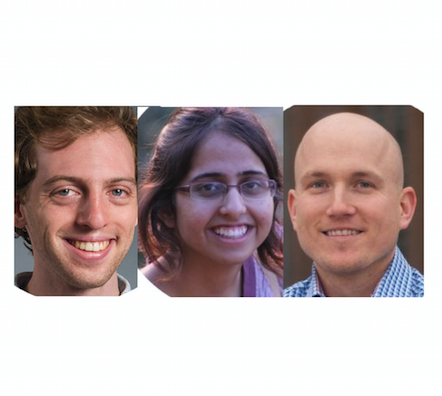CLTC is excited to announce the arrival of three new researchers to our team:
Nick Merrill, Post-Doctoral Fellow
Nick Merrill, who recently earned his Ph.D. in the UC Berkeley School of Information, will be joining CLTC as a post-doctoral fellow. Merrill worked in UC Berkeley’s BioSENSE Lab, where he explored the use of brainwaves as a method of authentication. His dissertation, “Mind-Reading and Telepathy for Beginners and Intermediates,” examines how beliefs about the mind, formal and informal, structure the way engineers model the mind, and how users understand these models as relevant in the course of life. At CLTC, he will apply a mixed-methods approach to explore questions such as how “ubiquitous biosensing blurs the line between sensing bodies and sensing minds, and what this moving boundary means for the future of cybersecurity,” he wrote in a proposal. “A readable mind is a hackable mind.” Nick is also developing a game to help software engineers forecast security threats, and studying their gameplay to understand the perceived boundaries of computer security.
Tarunima Prabhakar, Research Fellow
 Tarunima Prabhakar will conduct research on classification and discrimination by machine learning in India. Prabhakar, who recently earned her masters degree at the Goldman School of Public Policy, has a background in computer science and is interested in technology policy issues, more specifically in developing countries. She will investigate private- and public-sector uses of AI, machine learning, and predictive analytics in India, with a specific focus on applications in health and finance. She will interview technologists and consult with legal scholars to ultimately build a taxonomy of protected classes in India that may be inadvertently discriminated against through algorithms.
Tarunima Prabhakar will conduct research on classification and discrimination by machine learning in India. Prabhakar, who recently earned her masters degree at the Goldman School of Public Policy, has a background in computer science and is interested in technology policy issues, more specifically in developing countries. She will investigate private- and public-sector uses of AI, machine learning, and predictive analytics in India, with a specific focus on applications in health and finance. She will interview technologists and consult with legal scholars to ultimately build a taxonomy of protected classes in India that may be inadvertently discriminated against through algorithms.
Steve Trush, Research Fellow
 Steve Trush will support CLTC’s research on cybersecurity threats to politically vulnerable organizations as well as other emerging topics. As a member of the United States military and other federal government agencies, he has spent over a decade supporting international security initiatives, with work ranging from data analysis and policy advising to technology development and training. A recent graduate of the Masters of Information Management and Systems program at the UC Berkeley School of Information, Trush recently held a research fellowship through the United States Agency for International Development (USAID), where he evaluated and designed agent-based data collection networks in rural areas of India and Myanmar with limited connectivity.
Steve Trush will support CLTC’s research on cybersecurity threats to politically vulnerable organizations as well as other emerging topics. As a member of the United States military and other federal government agencies, he has spent over a decade supporting international security initiatives, with work ranging from data analysis and policy advising to technology development and training. A recent graduate of the Masters of Information Management and Systems program at the UC Berkeley School of Information, Trush recently held a research fellowship through the United States Agency for International Development (USAID), where he evaluated and designed agent-based data collection networks in rural areas of India and Myanmar with limited connectivity.


